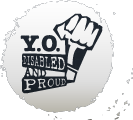Blog Post Topics
 YO! Disabled and Proud 2019 Blog Topics
YO! Disabled and Proud 2019 Blog Topics
Are you interested in writing for YO! Blog?
Scroll down to check out the topics we’re taking submissions for!
Guidelines for YO! Blog Guest Writers
Must be a youth ages 16-28 years old
No hate speech directed towards a group (unless it is part of past events)
Trigger and content warn your submissions (not sure what those are? We will help you figure it out)
Keep cursing to a minimum
Only individuals who fit the description of the intersectionality topic can submit on that topic, (just like a non-disabled people can’t speak to what it is like to be disabled, non-LGBTQ or non-people of color can not speak for those topics).
We will feature written blogs, picture blogs and video blogs.
Written Blogs: should be between 250 – 1000 words.
Picture Blogs: Caption your photos with descriptions of the content. 5 pictures per topic.
Video blogs: 1:30-3:00 minutes with caption.
Leadership & Empowerment
- Why I volunteer or Intern
- Bringing up the “D” Word: Disability Disclosure
- Getting Employed: How I got my first job
- Let’s Talk Accommodations
- Learning From Your Volunteer & Internship Experiences
- Building a Clean and Clear Resume
- The Balance Between Disability Self-Care Needs and Working
- Dealing gracefully with annoying disability discriminatory attitudes and comments in the workplace and the world.
- Learning how to live on a budget and anticipate expenses
Disability History and Education
- Who Cares About Disability History Week?
- Things you can do to honor or celebrate Disability History Week at your school or community organization
- 6 Years after Disability History Week was passed by the legislature
- How my school or community reacted when I organized a Disability History event
- Top 5 ways to educate people about disability history
- Why it was important to get my college text book changed
- What’s it like to have an invisible disability in school
- What is it like to have a visible disability in school
- Why I didn’t use accommodations my first year of college
- Why I was afraid to tell professors my disability affected my ability to complete my course work
- Medical absences are valid and not an excuse
Healthcare and Fighting the Medical Model
- Growing up everyone wanted to cure me
- When is it best to switch from a pediatrician to a doctor for adults
- How do I hold my insurance accountable if they take forever getting me medical equipment
- Bad bed side manner shouldn’t be allowed just because you’re disabled
- Know your rights: how to find a healthcare advocate to help you
- What’s the difference between Medicare and Medicaid
- How my disability makes dealing with medical professionals difficult
- Accessibility is more than just getting through the door
- Don’t be afraid to ask questions: How to prep for an appointment
- A doctor isn’t always right: Learning to say no
- How to deal with Doctor appointment anxiety
Anti-Bullying
- Realizing my first bully(ies) was a part of my family
- How inspiration porn made me feel like I couldn’t complain
- Having an invisible disability and your friends insulting you with their “jokes”
- Bullying within the disabled community
- Micro –aggressions add up: why telling someone their disability isn’t that bad is the worst
- Crushing crushes: when you get made fun of for liking someone
- Bashing my dream is bashing me; school officials limiting my options
- Professional bully :what it’s like to have a bully in the work place
- Justifying ignorance: often after someone is called out for being a bully the person harassed is called to educate them. Is that fair?
- How do you heal from bullying?
- Kids who’ve been bullied that are now adults: how did bullying shape you?
Intersectional Issues
- The struggle of claiming my disability as a person of color
- Disabled women! What’s it mean to be a disabled women/girl in the workplace. How do we address sexism as women with disabilities?
- The realities of being a black person with an invisible disability
- My gender identity and/or sexual orientation is not a “sickness”…But I do have some actual disabilities I’d like to have acknowledged
- What are medical appointments like when you are both the patient and the translator?
- Going from no one thinking someone with a disability and from a low income family will amount to anything; to being the first person in your family to go to college.
- When you love your culture but your culture doesn’t embrace all of you: the stigma, fear, pity and loathing is part of my ancestral culture
- The weight of being overweight and disabled